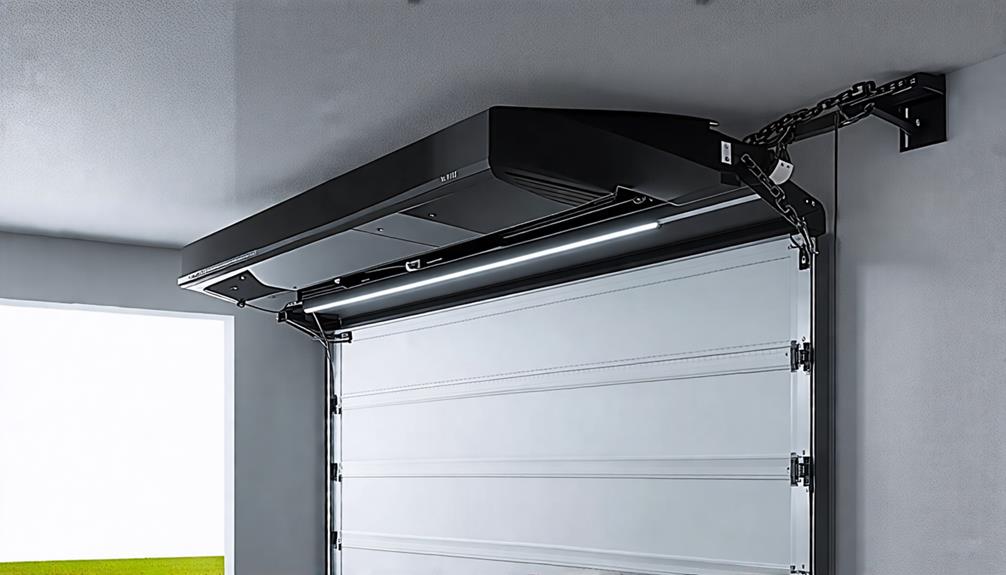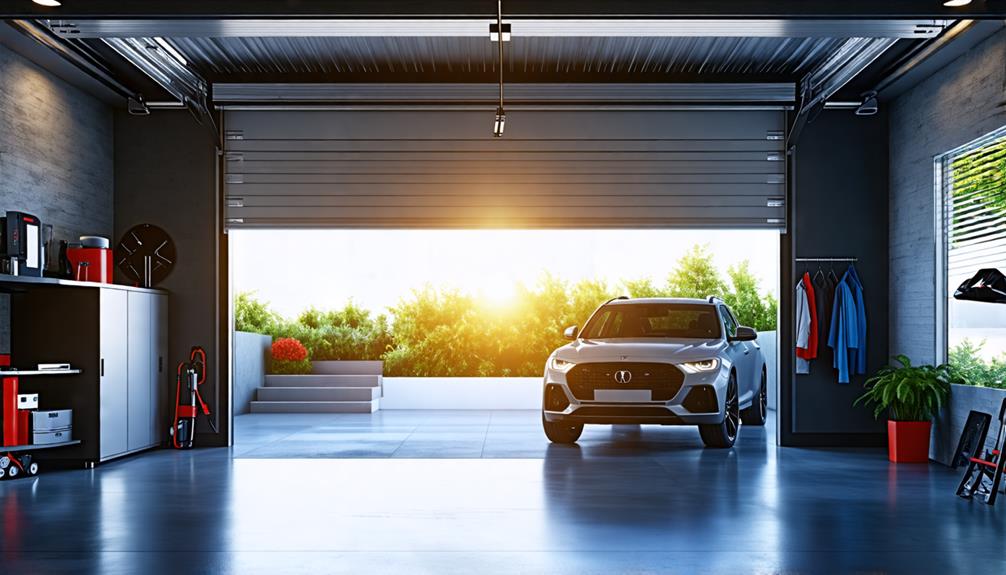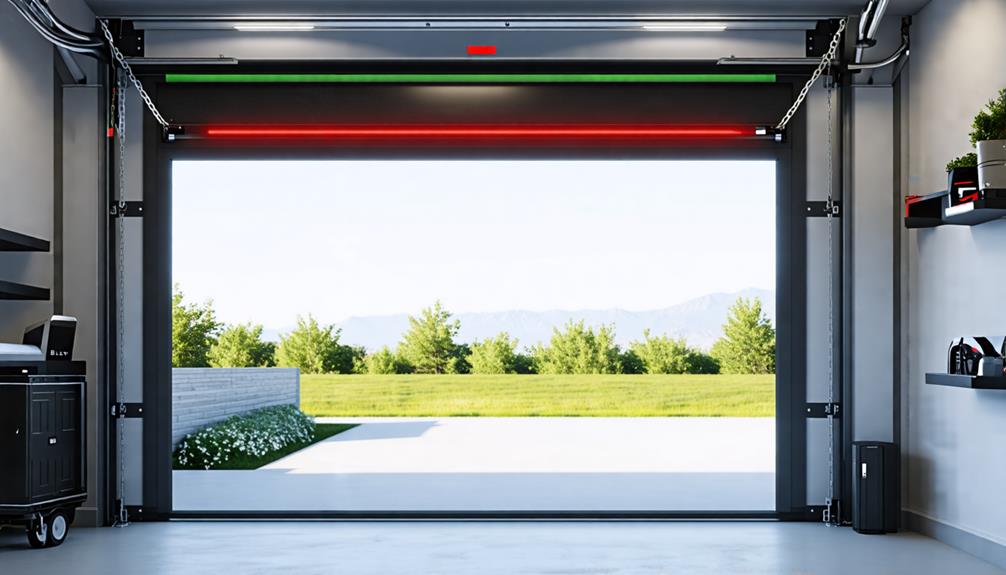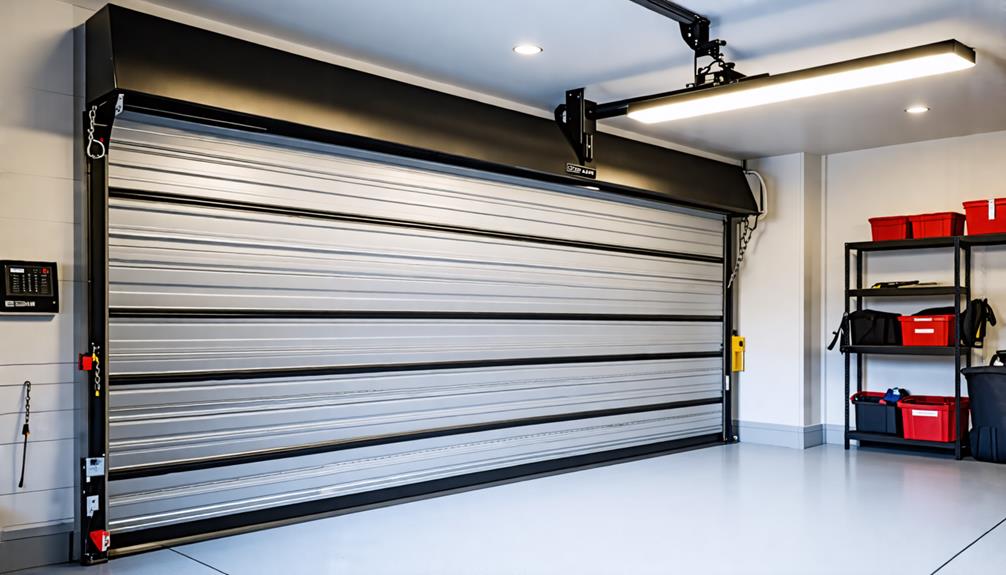
What Brand of Garage Door Opener Is the Most Reliable?
When considering the most reliable garage door opener brands, you'll find Chamberlain, LiftMaster, and Genie consistently topping the list. These manufacturers have earned their reputation through years of producing durable, innovative, and long-lasting openers. They offer a range of models with features like belt-drive systems for quieter operation, DC motors for reduced maintenance, and advanced safety sensors. You'll also find smart home integration capabilities, allowing for remote access and monitoring. While reliability can vary between specific models, these brands generally provide robust performance and excellent customer support. Exploring the unique offerings of each brand will help you determine which best suits your specific needs and preferences.
Quietest Garage Door Opener

When considering the quietest garage door opener for your home, you'll want to weigh the merits of belt-driven versus chain-driven systems. Belt-driven openers, typically using reinforced rubber belts, offer significantly quieter operation compared to their chain-driven counterparts. This difference is especially noticeable when you need emergency repairs and have to operate the door manually.
To further reduce noise, look for models incorporating vibration dampening technology, such as isolated motor mounts or sound-absorbing materials. Additionally, the type of motor plays an indispensable role in noise reduction, with DC motors generally providing smoother, quieter operation than traditional AC motors.
Regular preventive maintenance can also help maintain the door's operation at its quietest by identifying potential issues before they become problems.
Belt-Driven Vs Chain-Driven
Two key factors distinguish belt-driven and chain-driven garage door openers: noise level and overall performance. Belt-driven openers use a rubber belt reinforced with steel, resulting in a quieter operation compared to chain-driven models. If you're seeking a peaceful home environment, especially with bedrooms above or near the garage, a belt-driven opener might be your best choice.
Chain-driven openers, while noisier, are known for their durability and lower cost. They utilize a metal chain similar to a bicycle chain, which can withstand heavy use and extreme temperatures. However, the metal-on-metal contact produces more noise and vibration.
When considering performance, both types offer reliable operation. Belt-driven openers generally provide smoother motion and require less maintenance, as they don't need regular lubrication. Chain-driven models, though, can handle heavier doors and may be more suitable for commercial applications or oversized residential doors.
Which should you choose? Consider your priorities: noise reduction, initial cost, long-term maintenance, and door weight. Remember, proper installation and regular maintenance are essential for ideal performance and longevity, regardless of the drive type you select.
Vibration Dampening Technology
How can you achieve whisper-quiet operation from your garage door opener? The answer lies in vibration dampening technology, a pivotal feature in modern garage door systems. This innovative approach drastically reduces noise by absorbing and dissipating mechanical vibrations generated during operation.
You'll find that high-end models often incorporate DC motors, which are inherently quieter than their AC counterparts. These motors, coupled with soft start and stop technology, minimize the jarring sounds associated with door movement initiation and completion.
Additionally, manufacturers employ isolation mounts, typically made of rubber or neoprene, to separate the motor from the chassis, further reducing vibration transfer.
Have you considered the role of belt drives in noise reduction? Unlike chain drives, belt-driven systems utilize reinforced rubber or polyurethane belts that operate more smoothly and quietly. Some advanced openers even feature helical gears, which mesh more efficiently than traditional spur gears, resulting in quieter operation.
When selecting a garage door opener, pay attention to the noise rating, often measured in decibels. Opt for models with lower ratings to guarantee a quieter home environment. Remember, proper installation and regular maintenance are equally important in maintaining ideal noise performance.
Motor Type Matters
The motor heart of your garage door opener plays an essential role in determining its noise level. When selecting a quiet opener, you'll want to focus on the motor type. There are three main types of motors commonly used in garage door openers:
- Chain drive: These are typically the loudest and least expensive options, utilizing a metal chain to move the door.
- Belt drive: Vastly quieter than chain drives, belt-driven openers use a rubber belt for smoother operation.
- Direct drive: The quietest option available, these motors have fewer moving parts and operate with minimal vibration.
You'll find that most ultra-quiet garage door openers use either belt drive or direct drive systems. Have you considered the long-term benefits of investing in a quieter motor? While they may cost more initially, the reduced noise can greatly improve your home's comfort level, especially if you have living spaces adjacent to or above the garage. Additionally, quieter motors often indicate higher quality components and construction, which can translate to improved durability and longevity.
When comparing models, pay attention to the decibel ratings provided by manufacturers. Lower numbers indicate quieter operation, with some high-end models boasting noise levels below 50 decibels.
Benefits

When you invest in a reliable garage door opener, like the ones offered by our Garage Door Service & Installation, you'll enjoy a range of benefits that enhance your daily life. Along with the long-lasting performance, our service provides a quick and efficient solution to your door problems.
You'll experience convenient remote access, allowing you to effortlessly open and close your garage door from the comfort of your vehicle. Additionally, a dependable opener contributes to enhanced home security and reduced maintenance needs, providing peace of mind and saving you time and money in the long run.
Long-Lasting Performance
Investing in a reliable garage door opener pays off in the long run with its long-lasting performance. When you choose a high-quality opener, you're not just buying a device; you're investing in years of trouble-free operation. Top-tier brands often offer warranties that extend up to a decade, demonstrating their confidence in their products' durability.
To guarantee your garage door opener stands the test of time, consider these key factors:
- Motor strength: A robust motor can handle frequent use without strain, reducing wear and tear.
- Belt or chain drive: Belt drives tend to be quieter and require less upkeep, while chain drives offer durability at a lower cost.
- Safety features: Look for openers with advanced safety sensors and auto-reverse mechanisms to prevent accidents and extend the opener's lifespan.
Regular maintenance is pivotal for maximizing your opener's longevity. Lubricating moving parts, tightening hardware, and inspecting cables and springs annually can greatly extend its operational life. Remember, a well-maintained opener not only lasts longer but also operates more efficiently, saving you money on energy costs and potential repairs over time.
Convenient Remote Access
With modern garage door openers, you'll enjoy the convenience of remote access that transforms your daily routine. No longer will you need to manually open your garage door in inclement weather or struggle with heavy lifting. Instead, you'll have the ability to control your garage door from the comfort of your vehicle or even your smartphone.
Many reliable brands offer remote access features that go beyond basic functionality. You'll find options for multiple-device compatibility, allowing you to operate your garage door from various platforms. Have you considered the benefits of geofencing technology? This advanced feature automatically opens your garage door as you approach, eliminating the need to fumble for a remote control.
Security is paramount, and top manufacturers implement rolling code technology to prevent unauthorized access. You'll appreciate the peace of mind knowing that your garage door's access code changes with each use, thwarting potential intruders. Some systems even offer real-time notifications, alerting you when your garage door opens or closes. How might this feature enhance your home security? Additionally, you'll find that many reliable openers integrate seamlessly with smart home systems, allowing for voice-activated control and scheduled operations.
Enhanced Home Security
Beyond the convenience of remote access, modern garage door openers substantially bolster your home's security. These devices incorporate advanced features that deter potential intruders and provide you with greater control over your property's access points. Many reliable brands offer rolling code technology, which changes your opener's access code each time you use it, preventing code theft and unauthorized entry.
To enhance your home's security with a garage door opener, consider the following features:
- Smart connectivity: Monitor and control your garage door remotely via smartphone apps, allowing you to check its status and receive alerts for unusual activity.
- Battery backup: Guarantee your garage door remains operational during power outages, maintaining security when you need it most.
- Motion-activated lighting: Illuminate your garage and driveway when movement is detected, deterring potential intruders and enhancing visibility.
Additionally, some high-end models integrate with home security systems, creating a comprehensive protection network. You'll find that many reputable brands offer tamper-resistant features, such as automatic door locks and vacation modes, which disable remote access when you're away for extended periods. By investing in a reliable garage door opener with advanced security features, you're taking a proactive step in safeguarding your home and family.
Reduced Maintenance Needs
Modern garage door openers offer more than just convenience and security; they're designed to minimize maintenance headaches. You'll find that today's models incorporate advanced technologies and durable materials, vastly reducing the need for frequent upkeep.
For instance, many high-end openers now feature belt-drive systems, which operate more smoothly and quietly than traditional chain drives, resulting in less wear and tear over time.
Have you considered the benefits of a DC motor? These motors, found in premium garage door openers, require less maintenance than their AC counterparts due to their more efficient operation and fewer moving parts. Additionally, many manufacturers now use sealed ball bearings in their openers, eliminating the need for regular lubrication.
Smart diagnostic systems are another innovation you'll appreciate; they can alert you to potential issues before they become major problems, allowing for proactive maintenance.
When selecting a reliable garage door opener, look for models with self-lubricating components and corrosion-resistant materials. These features can dramatically extend the lifespan of your opener and reduce the frequency of repairs. Remember, investing in a low-maintenance opener can save you time and money in the long run.
Safety Features and Sensors

When considering garage door opener reliability, you'll find that safety features and sensors play a vital role in protecting you and your family. Modern openers come equipped with sophisticated anti-entrapment mechanisms and automatic reversing systems, which prevent accidents and injuries. You'll also benefit from remote operation safeguards, ensuring your garage door can't be accidentally activated from a distance.
| Safety Feature | Function |
|---|---|
| Anti-Entrapment | Detects obstacles and stops door movement |
| Automatic Reverse | Reverses door direction upon sensing resistance |
| Photo Eye Sensors | Uses infrared beams to detect objects in door's path |
| Remote Encryption | Prevents unauthorized access to opener's signal |
Anti-Entrapment Mechanisms
For garage door openers, anti-entrapment mechanisms are essential safety features designed to prevent injuries and accidents. These mechanisms work in tandem with sensors to detect obstructions and reverse the door's motion if something is in its path. You'll find that most modern garage door openers incorporate at least one of the following anti-entrapment features:
- Auto-reverse mechanism: This system automatically reverses the door's direction when it encounters resistance while closing.
- Photoelectric sensors: Infrared beams across the door's opening detect objects or people, triggering the door to stop and reverse.
- Pressure-sensitive safety edges: These strips along the bottom of the door sense contact and signal the opener to stop and reverse.
When you're evaluating garage door opener reliability, it's imperative to ponder the effectiveness of these anti-entrapment mechanisms. How quickly does the system respond to obstructions? What's the minimum force required to trigger the auto-reverse? Are the sensors easily aligned and resistant to environmental factors? Remember, a reliable opener isn't just about smooth operation; it's about consistent safety performance. Can you trust your opener to protect your family and possessions day in and day out?
Automatic Reversing Systems
In light of safety concerns, automatic reversing systems have become a cornerstone of garage door opener dependability. These systems, typically consisting of photoelectric sensors or pressure-sensitive edges, are designed to prevent the door from closing on people, pets, or objects. When you're shopping for a garage door opener, you'll want to confirm it's equipped with this pivotal safety feature.
How does an automatic reversing system work? Two sensors, usually placed about six inches above the ground on either side of the door, emit an invisible beam. If this beam is interrupted while the door is closing, the opener immediately reverses the door's direction. Additionally, many modern openers include a secondary safety mechanism that detects resistance if the door contacts an object while closing. This feature causes the door to stop and reverse, providing an extra layer of protection.
You should regularly test your opener's reversing system to confirm it's functioning correctly. Place a solid object, like a piece of wood, in the door's path and activate the closer. If working properly, the door should reverse upon contacting the object. Remember, a reliable automatic reversing system isn't just a convenience—it's a critical safety feature that could prevent serious accidents.
Remote Operation Safeguards
Beyond the automatic reversing system, garage door openers employ additional safety features for remote operation. You'll find that modern openers incorporate sophisticated safeguards to prevent accidents and unauthorized access. These features typically include:
- Rolling code technology: This system changes the access code each time you use your remote, making it nearly impossible for thieves to intercept and replicate your signal.
- Motion sensors: These detect movement in the garage and automatically turn on lights, enhancing safety and deterring potential intruders.
- Smartphone integration: Many openers now allow you to control and monitor your garage door remotely via a mobile app, providing real-time status updates and alerts.
Have you considered the importance of backup battery systems? During power outages, these allow you to operate your door, guaranteeing you're never locked out. Additionally, some models feature timer-to-close functionality, automatically shutting the door after a set period if you forget.
How secure is your current system? It's essential to regularly test and maintain these safety features to confirm they're functioning correctly. Remember, while convenience is important, the primary goal of these safeguards is to protect you, your family, and your property from potential harm or unauthorized access.
Frequently Asked Questions
How Long Does a Typical Garage Door Opener Last?
You can expect your garage door opener to last 10-15 years with proper maintenance. However, it's not uncommon for some to function for up to 20 years. Regular servicing and prompt repairs will help extend its lifespan.
Can I Install a Garage Door Opener Myself?
You can install a garage door opener yourself if you're handy and have the right tools. However, it's a complex job that involves electrical work and safety considerations. For best results, you might want to hire a professional.
Are Smart Garage Door Openers Compatible With All Door Types?
You'll find that most smart garage door openers are compatible with various door types. However, it is crucial to check the specifications before purchasing. Some may require additional adapters or hardware for certain doors, so always verify compatibility first.
What's the Average Cost of Professional Garage Door Opener Installation?
You'll typically spend between $200 to $500 for professional garage door opener installation. This cost can vary based on your location, the complexity of the installation, and the type of opener you've chosen. Don't forget to factor in labor costs.
How Often Should a Garage Door Opener Be Serviced or Maintained?
You should service your garage door opener annually. Schedule professional maintenance to check springs, cables, and safety features. Regularly lubricate moving parts and test the auto-reverse function monthly. Don't forget to replace batteries in remotes as needed.





